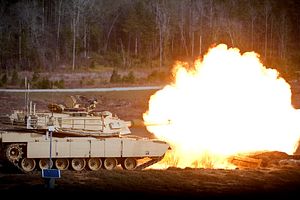On Monday, the U.S. State Department notified lawmakers that two major arms packages had been approved for Taiwan. The packages, amounting to $2.2 billion in materiel and support equipment, include Stinger missiles and tanks.
Specifically, DSCA approved the sale of 108 M1A2T Abrams tanks, along with a range of support equipment and arms, including M2 Chrysler Mount machine guns, M240 machine guns, M88A2 HERCULES vehicles, and M1070A1 Heavy Equipment Transporters. This first package is valued at an estimated $2 billion.
In a separate package, DSCA also approved the sale of 250 Block I -92F MANPAD Stinger missiles and four I-92F MANPAD Stinger Fly-to-Buy missiles. This second package is valued at an estimated $223.56 million.
Taiwan’s request to purchase these systems has been public for months. Speaking in March, Tsai said that the tanks and Stinger missiles would “greatly enhance [Taiwan’s] land and air capabilities, strengthen military morale and show to the world the U.S. commitment to Taiwan’s defense.”
Earlier this year, the United States adopted the Asia Reassurance Initiative Act, which calls for the White House to establish “a multifaceted strategy to increase U.S. security, economic interests and values in the Indo-Pacific region.”
Among the act’s main provisions, it calls on the U.S. president to support the transfer of “defense articles” to Taiwan and promote high-level official visits, which were also encouraged by the Taiwan Travel Act, which was signed into law last year.
Last month, China’s Ministry of Foreign Affairs stated its opposition to the possible sale. “This position is consistent and clear,” Chinese foreign ministry spokesman Geng Shuang said at the ministry’s daily briefing.
“We urge the U.S. to fully understand the high sensitivity and serious harm of the issue of arms sales to Taiwan and abide by the one-China principle.”
Relations across the Taiwan Strait have deteriorated markedly since the 2016 inauguration of President Tsai Ing-wen, who hails from the independence-leaning Democratic Progressive Party.
The announcement of the arms sale comes shortly after the personal encounter between U.S. President Donald J. Trump and Chinese President Xi Jinping at the Group of 20 summit meeting in Osaka, Japan.
If concluded, the sales would represent the first major U.S. arms deals with Taiwan since the celebration of 40 years of the Taiwan Relations Act in April this year.
The 1979 Taiwan Relations Act has governed the United States’ non-official relationship with Taipei and requires U.S. presidents to support Taiwan by providing “arms of a defensive character.”
Formal U.S. diplomatic ties with Taiwan ended in 1979 when the second U.S.-China joint communiqué established formal Washington-Beijing ties.

































